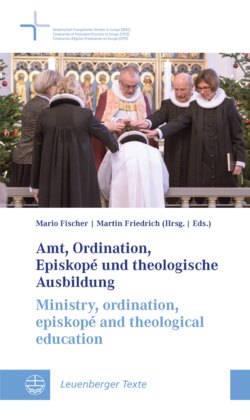Читать книгу Amt, Ordination, Episkopé und theologische Ausbildung / Ministry, ordination, episkopé and theological education - Группа авторов - Страница 28
2.2.6Gender and sexual orientation in regard to the ministries
Оглавление58. An issue of great importance is the need for “a deeper understanding of the comprehensiveness of ministry which reflects the interdependence of men and women”.45 With few exceptions46 – the churches of CPCE practice the ordination of women and men to their ordained ministries, considering that the fundamental condition for ordained ministry is baptism and faith. This stance has been highlighted by all confessional families within CPCE.47
59. There is a broad consensus among churches of CPCE that the ministry of both women and men is a gift of God. The churches of CPCE have already emphasised their common conviction in the Neuendettelsau Theses (1982/86) and expressed the expectation that a broader convergence might be achieved among the churches of the world at this point: “Neither race nor gender can have decisive significance for the call to the service of public proclamation and administration of sacraments (Galatians 3:27f). Churches in which women are not yet ordained and in which women ministers are not allowed must ask themselves whether this historically conditioned practice corresponds to contemporary Reformation understanding of ministry and congregation.”48
60. Although this is a non-negotiable principle, the CPCE churches do not reject cooperation with other churches which so far do not ordain women. All ministries can be recognised as authentic even if – in the CPCE view wrongly – they are limited to men.49
61. Among the questions concerning access to the ministries in the church, one of the most debated issues today is the question whether living in a homosexual relationship or having a known homosexual orientation should be regarded as an obstacle for ordination and the conduct of the ministry of word and sacraments, or other services in the church. Among the churches of CPCE the differing positions adopted include an open acceptance of ministers who live in a homosexual relationship, an expectation of a celibate life for those who are homosexual, and a more or less explicit condemnation of homosexuality.50 All churches are convinced that their diverging positions are founded on faithfulness to the Gospel. At the same time, the churches of CPCE agree that this issue should not become divisive for their church fellowship. Since, however, they are still a long away from a consensus on this issue, there is a great need for further study and further prayer for guidance by the Holy Spirit.
